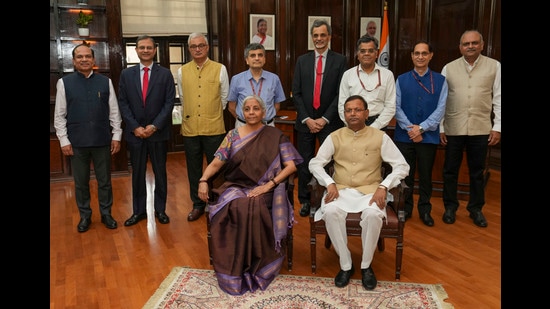Jul 22, 2024 09:12 PM IST
As the nation waits with bated breath for the Budget, know that it is one without a basis or a yardstick in the absence of the Census, and the reasons for this are purely political.
The full Budget for FY25 would be the fifth presented without the decennial Census. Essentially, the government doesn’t know how many people to plan for, the state of human resources, demography, culture, and economic structure at the local, regional and national levels, which are enumerated by the Census. The Census provides crucial data on various socio-economic aspects, including housing, urbanisation, fertility, mortality, migration, disability and more, serving as a foundation for evidence-based policymaking and resource allocation in the Budget.

Despite the BJP-led government’s claims that the pandemic forced the postponement of Census 2021, India has failed to conduct this three years after, unlike 143 out of 189 countries that successfully did so after March 2020. For the first time in over 150 years of Census history, dating back to 1872, India has failed to conduct this as per schedule. Data-driven governance enables planning and assessment of social welfare programmes, allowing for evaluation of their impact, and informed policymaking in Parliament.
The Public Accounts Committee (PAC) has stressed the need for updated data for flagship schemes of the government. For instance, the PAC report for FY24, questions the identification of beneficiaries for National Social Assistance Programme (NSAP), “based on outdated data from the census for 2001 and poverty ratios from 2004-05 which may not accurately reflect current demographic and economic circumstances of states.” Another PAC Report (FY24) on agriculture, revealed “that coverage of farmers in the country… was very low compared to the population of farmers as per Census 2011” for the Pradhan Mantri Fasal Bima Yojana. Similar scathing observations have been made for schemes such as Tribal Sub Plan, Pradhan Mantri Janjati Adivasi Nyaya Maha Abhiyan, Pradhan Mantri Awas Yojana, and Ayushman Bharat. Several economists have pointed out that the National Food Security Act, rolled out based on 2011 Census data, has excluded 10 crore beneficiaries.
Government acolytes may point to the fact that policymaking hasn’t stopped without a Census since India conducts government surveys from time to time. They are wrong. No survey could be as wide as the Census. Sample this. The latest National Health Family Survey (NFHS-5) has a sample size of just 8.25 lakh people. The Periodic Labour Force Survey (PLFS) surveyed only 4.19 lakh people, while the NSS 78th Round Multiple Indicator Survey had a sample size of 11.63 lakh people. These surveys have an importance of their own, but none can match the Census, which is the most comprehensive and credible source of information on India’s demographic and socio-economic conditions, enumerating all 140 crore Indians, making it unparalleled in scope and accuracy compared to other surveys.
The absence of a decennial Census has far-reaching implications for the states. For the devolution of funds by the Finance Commission under Article 270, whereby tax revenue collected by the Centre is shared between the states and the Centre, the population of a state has always been a criterion, as has been the human development indices for deciding the share between the states in horizontal devolution. Without the Census, these data are, at best, dated. The delayed 2021 Census has disrupted the usual cycle, impacting fiscal federalism. The 16th Finance Commission, starting in 2026, will not have access to updated Census data, unlike the 15th Commission, which used 2011 data instead of 1971 data, highlighting the importance of timely Census data for informed decision-making.
So, why is the NDA government shifting the Census year from 2021? There are two plausible, purely political reasons. First, the Census data could reveal the true state of India’s development, potentially contradicting the government’s claims of “Amrit Kaal” and “Viksit Bharat” by providing facts on job quality, health, gender justice, access to water supply, and housing.
Second, delaying the 2021 Census enables the BJP to implement delimitation before the 2029 general elections. Delimitation aims to redraw the boundaries of the Lok Sabha seats based on population increase, but the 84th Constitutional Amendment allows it only after the first Census after 2026. This would ordinarily be after the decennial Census in 2031. Delaying the Census till after 2026 would meet the criteria of the 84th Amendment and catch the 2029 election.
Delimitation before 2029 is critical for the BJP’s victory. One look at Assam, which has become a laboratory for the BJP, will show us how. The recent delimitation there redrew the boundaries, adjusting population and seats in a way where lines were drawn to ensure that the BJP vote bank dominates the majority of the seats. What is blasphemous is that the exercise was done based on the 23-year-old 2001 Census and with no increase in the total number of seats of 126. Only boundaries were changed to help the BJP’s electoral ambitions.
As the nation waits with bated breath for the Budget, know that it is one without a basis or a yardstick in the absence of the Census, and the reasons for this are purely political.
Sushmita Dev is member, Rajya Sabha, from the Trinamool Congress.The views expressed are personal
Story Saved


